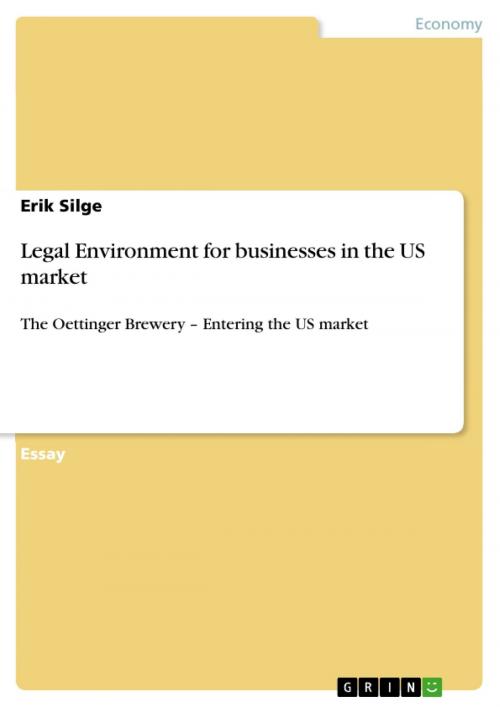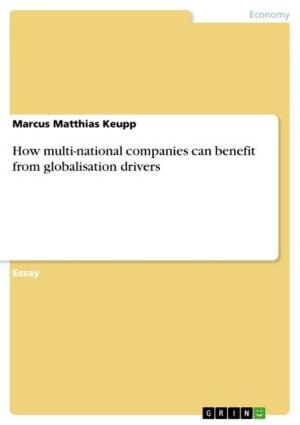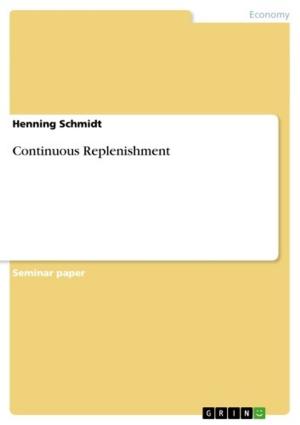Legal Environment for businesses in the US market
The Oettinger Brewery - Entering the US market
Nonfiction, Social & Cultural Studies, Political Science, Politics, Economic Policy| Author: | Erik Silge | ISBN: | 9783640364756 |
| Publisher: | GRIN Publishing | Publication: | July 3, 2009 |
| Imprint: | GRIN Publishing | Language: | English |
| Author: | Erik Silge |
| ISBN: | 9783640364756 |
| Publisher: | GRIN Publishing |
| Publication: | July 3, 2009 |
| Imprint: | GRIN Publishing |
| Language: | English |
Essay from the year 2009 in the subject Business economics - Economic Policy, grade: 1,0, Pfeiffer University, language: English, abstract: This summary deals with a German company planning to enter the US market. The company 'Oettinger Brauerei GmbH' is engaged in the business of beer brewing. It is a well established brand on the German market with a rapidly growing market share. The company has discovered a competitive gap in brewing a brand beer and distributing it at a low price - they promote their products with the slogan 'Germany's price-worthiest brand beer'. The same strategy could be pursued on the US market, as there are already foreign beers (e.g. from Belgium, Netherlands, and from Germany), but those are relatively expensive. This is due to the fact that only upper scale brands from Europe have yet entered the American beer market. Furthermore, as the total percentage of beer brewed in Germany is declining, there is an upcoming need for German beer producers to search for new markets abroad. To successfully transfer its strategy of cost leadership, Oettinger will have to produce its beer locally in the USA to save import fees and distribution costs. There are some issues that arise with this option concerning accounting, taxes, finance, and law - this summary will concentrate on certain aspects of law Oettinger will have to deal with. Additionally, because the company is a rather small brewery considering its market capitalization, it has not the financial strength like for example the giant brewer Inbev. The legal side of entering this new market should include both economic and risk related aspects. This paper will therefore primarily deal with the concept of strict liability and organizational options. In general Oettinger can chose between setting up a new business in the USA, simply importing its products (which has already been excluded above), and producing in the US at another directly owned facility.
Essay from the year 2009 in the subject Business economics - Economic Policy, grade: 1,0, Pfeiffer University, language: English, abstract: This summary deals with a German company planning to enter the US market. The company 'Oettinger Brauerei GmbH' is engaged in the business of beer brewing. It is a well established brand on the German market with a rapidly growing market share. The company has discovered a competitive gap in brewing a brand beer and distributing it at a low price - they promote their products with the slogan 'Germany's price-worthiest brand beer'. The same strategy could be pursued on the US market, as there are already foreign beers (e.g. from Belgium, Netherlands, and from Germany), but those are relatively expensive. This is due to the fact that only upper scale brands from Europe have yet entered the American beer market. Furthermore, as the total percentage of beer brewed in Germany is declining, there is an upcoming need for German beer producers to search for new markets abroad. To successfully transfer its strategy of cost leadership, Oettinger will have to produce its beer locally in the USA to save import fees and distribution costs. There are some issues that arise with this option concerning accounting, taxes, finance, and law - this summary will concentrate on certain aspects of law Oettinger will have to deal with. Additionally, because the company is a rather small brewery considering its market capitalization, it has not the financial strength like for example the giant brewer Inbev. The legal side of entering this new market should include both economic and risk related aspects. This paper will therefore primarily deal with the concept of strict liability and organizational options. In general Oettinger can chose between setting up a new business in the USA, simply importing its products (which has already been excluded above), and producing in the US at another directly owned facility.















